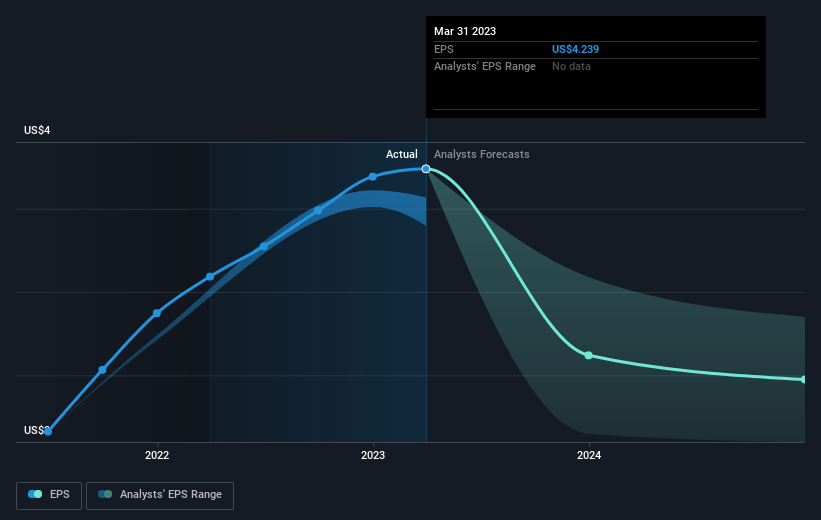- United States
- /
- Banks
- /
- NasdaqGS:BPRN
Princeton Bancorp's (NASDAQ:BPRN) 13% CAGR outpaced the company's earnings growth over the same three-year period

It hasn't been the best quarter for Princeton Bancorp, Inc. (NASDAQ:BPRN) shareholders, since the share price has fallen 15% in that time. In contrast the stock is up over the last three years. In that time, it is up 32%, which isn't bad, but not amazing either.
Since the stock has added US$25m to its market cap in the past week alone, let's see if underlying performance has been driving long-term returns.
Check out our latest analysis for Princeton Bancorp
To paraphrase Benjamin Graham: Over the short term the market is a voting machine, but over the long term it's a weighing machine. One way to examine how market sentiment has changed over time is to look at the interaction between a company's share price and its earnings per share (EPS).
Princeton Bancorp was able to grow its EPS at 30% per year over three years, sending the share price higher. This EPS growth is higher than the 10% average annual increase in the share price. So it seems investors have become more cautious about the company, over time. This cautious sentiment is reflected in its (fairly low) P/E ratio of 6.77.
The image below shows how EPS has tracked over time (if you click on the image you can see greater detail).

It's probably worth noting we've seen significant insider buying in the last quarter, which we consider a positive. That said, we think earnings and revenue growth trends are even more important factors to consider. Before buying or selling a stock, we always recommend a close examination of historic growth trends, available here..
What About Dividends?
It is important to consider the total shareholder return, as well as the share price return, for any given stock. Whereas the share price return only reflects the change in the share price, the TSR includes the value of dividends (assuming they were reinvested) and the benefit of any discounted capital raising or spin-off. So for companies that pay a generous dividend, the TSR is often a lot higher than the share price return. As it happens, Princeton Bancorp's TSR for the last 3 years was 43%, which exceeds the share price return mentioned earlier. This is largely a result of its dividend payments!
A Different Perspective
Princeton Bancorp shareholders gained a total return of 1.6% during the year. Unfortunately this falls short of the market return. But at least that's still a gain! Over five years the TSR has been a reduction of 0.4% per year, over five years. It could well be that the business is stabilizing. It's always interesting to track share price performance over the longer term. But to understand Princeton Bancorp better, we need to consider many other factors. Like risks, for instance. Every company has them, and we've spotted 2 warning signs for Princeton Bancorp (of which 1 makes us a bit uncomfortable!) you should know about.
If you like to buy stocks alongside management, then you might just love this free list of companies. (Hint: insiders have been buying them).
Please note, the market returns quoted in this article reflect the market weighted average returns of stocks that currently trade on American exchanges.
New: Manage All Your Stock Portfolios in One Place
We've created the ultimate portfolio companion for stock investors, and it's free.
• Connect an unlimited number of Portfolios and see your total in one currency
• Be alerted to new Warning Signs or Risks via email or mobile
• Track the Fair Value of your stocks
Have feedback on this article? Concerned about the content? Get in touch with us directly. Alternatively, email editorial-team (at) simplywallst.com.
This article by Simply Wall St is general in nature. We provide commentary based on historical data and analyst forecasts only using an unbiased methodology and our articles are not intended to be financial advice. It does not constitute a recommendation to buy or sell any stock, and does not take account of your objectives, or your financial situation. We aim to bring you long-term focused analysis driven by fundamental data. Note that our analysis may not factor in the latest price-sensitive company announcements or qualitative material. Simply Wall St has no position in any stocks mentioned.
About NasdaqGS:BPRN
Princeton Bancorp
Operates as the bank holding company for The Bank of Princeton that provides various banking products and services.
Excellent balance sheet with moderate growth potential.
Market Insights
Community Narratives



